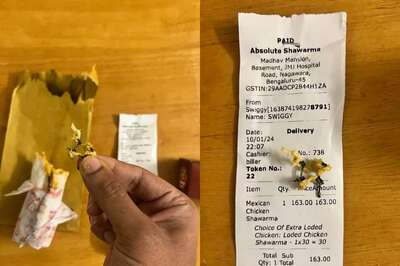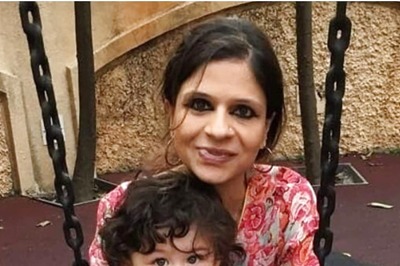
views
Tell yourself it's going to be okay.

Try some deep, calming breaths to ease your anxiety. In the immediate aftermath of a breakup, your emotions are swirling and it's hard to focus. Try to clear your mind and think only of your breath—air coming in, air going out. Repeat the cycle several times until you can feel yourself starting to become a little calmer. While you don't want to repress your emotions or your thoughts about the breakup, you also don't want to allow them to dictate how you feel and what you do with your life. Commit to moving forward
Resist the urge to argue or plead with him.

Accept and respect his decision in the moment so you can move on. When you're blind-sided by a breakup, you might want to argue with him or ask him why—and that's perfectly normal. But the truth is, knowing his reasons won't give you the sense of closure you want. In the immediate moment, be respectful and tell him that you accept his decision. You might say things like: "I feel like this is coming from out of nowhere, but I respect your decision and I wish you well." "I can't say I understand why you want to break up, but I accept your choice." "I respect your decision, even if I don't understand it."
Go no-contact with your ex for at least 2 weeks.

The best way to successfully move on is to stop talking to him. This means no messaging, no calling, and no texting. The only reason you should contact him is if it's necessary to fulfill joint responsibilities, such as co-parenting. If you want to say something to him about this, you might say, "I'm going to need some time to process this. Please don't contact me for the next couple of weeks." But you don't have to say anything at all if you don't want to. The length of time you stay no-contact is up to you. After 2 weeks, you might decide to give him a call or that you'd feel better within a month. You might then lengthen it to 2 months, or decide you never want to talk to him again. It's entirely your decision. If you want to build a friendship with your ex, it's easier to do that after you've recovered from the breakup. You don't want lingering feelings about the breakup to cloud your friendship, nor do you want to end up re-litigating the breakup every time you talk.
Give yourself some time to grieve.

A breakup is a loss and it's good to allow yourself to feel it. In the immediate aftermath of a breakup, respect your own grieving process. While it's not healthy to wallow, it also isn't healthy to shove down the pain and pretend it doesn't exist. Instead, grieve the loss in a way that will benefit you and allow you to move on. For example, if you want to cry, set aside some time to cry and let it out. Don't be afraid to let go and really feel your emotions in the moment—you'll feel better if you do. Remember that grief is different for everyone, so don't compare yourself to others. Nobody but you knows how long this is going to take you to get through. While you're grieving, be kind to yourself. Accept that you're grieving and might not have the energy or emotional capacity to do a lot of other things. If you need to take a day off from work or school and have the ability to do so, that might help.
Write about your thoughts and feelings in a journal.

Writing helps you let out your feelings and come to terms with things. Journaling is a good way to vent your frustrations and confusion in a way that won't hurt anyone. It helps you express your own grief and also gives you some insight into your relationship and how it ended. After some reflection, you might realize that the breakup wasn't as sudden as it initially seemed. Try writing for 15 to 30 minutes a day for the first week or so after the breakup. At that point, you can keep doing it if you feel like it's benefiting you—you might even decide to write for longer, or to expand your reflective writing to other aspects of your life. Write about the good as well as the bad. Writing about the positive aspects of your relationship can help you identify the ways that it really wasn't working. As you continue to write, you'll start to find a sense of peace and satisfaction with the way things turned out. Taylor Swift Taylor Swift, Singer & Businesswoman Songwriting can be a useful coping mechanism. "I've never thought about songwriting as a weapon. I've only thought about it as a way to help me get through love and loss and sadness and loneliness and growing up."
Take a break from social media for a couple of weeks.

Staying off social media helps you avoid posting something out of spite. Anger and resentment are normal parts of the grieving process. It's also pretty common to take to social media to vent your frustrations. After a couple of weeks, you can decide with a clearer head how you want to handle the situation with social media. Even going on to change your relationship status can lead to all kinds of questions that you don't feel like answering. It's much easier to do that once you've had some time to process what happened. If you don't trust yourself not to jump on social media out of habit, you might consider letting a trusted friend change your password for you so you can't log on. They'll give you the new password after a couple of weeks or whatever deadline you set.
Confide in a close friend or family member.

A supportive friend can help you get through your grief. Someone who can come over and help you care for yourself for the first day or two can be especially helpful. If that's not possible, just recounting what happened and talking about the relationship can help you understand the situation better than you did before. You might think talking about the breakup will just make you feel worse, but actually, the opposite is true. Research shows that talking about it improves your self-concept and decreases your feelings of sadness and loneliness—in other words, it helps. If you have trouble letting go after a couple of weeks, or if your grief turns into feelings of hopelessness and despair, talk about your thoughts and feelings with a counselor or therapist.
Perform a ritual to mark the end of the relationship.

Use this moment to say goodbye to him and hello to the rest of your life. Your loss or closure ritual could be a formal, solemn occasion or something wild and silly—the important thing is that it helps you move on. Box up the photos and mementos of your relationship and set them aside or give them to a friend, rather than having them around as daily reminders. For example, you might have a formal ceremony similar to a funeral and invite friends to attend. You might also write a letter to your ex (which you don't need to send to him) saying goodbye and read it aloud.
Revamp your living space to reflect the change.

Redecorating occupies your mind and helps you make a fresh start. When you have a little project to focus on, you're less likely to wallow in your grief. Plus, it gives you a chance to get rid of all the reminders of the relationship that are hanging around your place. If you can afford it, go out and buy some new sheets or a new blanket for your bed. Rearranging your furniture gives you a new perspective and can make it seem like a different place—it's like he was never there!
Do something to indulge or pamper yourself.

Treat yourself to something nice to boost your mood. The time after a breakup is perfect to do something nice for yourself. It doesn't have to be anything particularly expensive or time-consuming, just something that will make you feel good. What you do is entirely up to you. A lot of people pamper themselves by getting a manicure or going to a spa, but if you don't enjoy those activities, choose something else. You might go out to eat at your favorite restaurant or curl up with a cup of tea and your favorite book. Your treat might also involve making a change in your appearance. For example, it's pretty common to dye your hair or get it cut in a new style after a breakup. "Retail therapy" is another popular thing to do after a breakup. If you decide to take yourself shopping, though, set yourself a spending limit and don't blow your budget. Overspending will not help you feel better.
Follow a new daily routine that prioritizes self-care.

A routine also gives your life some structure and predictability. You've just been thrown for a loop, so everything probably feels pretty shaky right now. Following a strict routine means you'll know what's happening in your life in the coming days and weeks. Start new routines centered around mornings, meals, exercises and bedtimes to ensure that you're taking care of yourself. This also helps fill the time that you previously might've spent with your boyfriend. For example, you might start a bedtime routine of taking a long bath each evening while listening to relaxing music. After your bath, you might read a book for a little while before going to sleep.
Learn something new or try a new hobby.

A new hobby helps you distance yourself from your ex. If you're doing something you don't associate with him, you're creating new memories that don't involve him or remind you of him. Learning how to do something new also occupies your brain so you won't have as much time or energy to focus on the breakup. For example, if you're interested in art, you might take advantage of a local pottery or painting class. Craft stores have tons of inspiration if you're looking for something new to try. They often sell beginner kits with instructions that will help you start slowly on your own. Some also offer classes that can introduce you to different types of crafting styles. If you have a friend who's good at something, you might reach out to them to teach you. For example, if you have a friend who's played tennis for years, you might see if they want to go out and play with you and teach you the basics.
Volunteer to do something to help someone else.

Studies show helping others improves your sense of wellbeing. If you're feeling a bit down on yourself after the breakup, try giving a friend a hand with something or volunteering at a local animal shelter or soup kitchen. Making a positive difference in someone else's life will make you feel better about your own. The experience can also help you put your situation in perspective. As much as it hurts to get dumped, there is a way through it.
Take a short trip to recharge and reconnect with yourself.

Sometimes a change of scenery can help you find a sense of closure. Whether it's a weekend away or a two-week excursion, a trip solo or with friends will help you see yourself in a different light. Exploring a new place, especially by yourself, builds your confidence and independence. For example, you might plan a solo road trip around the region where you live, or drive to visit some friends or relatives a few hours away who you haven't seen in a while. If you're thinking about a trip, get better rates by going somewhere during the off-season. For example, if it's late fall or winter, you can probably get a better deal on accommodations at the beach. Just the planning of the trip gives you something to think about and helps take your mind off the breakup. So even if you can't afford to take off any time soon, you might consider planning a trip for sometime in the next year.
Stay away from unhealthy coping strategies.

Numbing your pain with alcohol or drugs can cause bigger problems in the long run. Alcohol or drugs might make you feel better for a brief period of time, but afterward, you'll likely feel even worse. As tempting as it might be (and as good as a glass of wine might taste right now), you'll do better if you stay 100% aware and in control of yourself. This doesn't mean you have to abstain completely. If a friend invites you out for a drink a few days after the breakup, that's probably fine. But drinking alone, or feeling as though you "need" a drink, could be a sign of an unhealthy dependence.




















Comments
0 comment